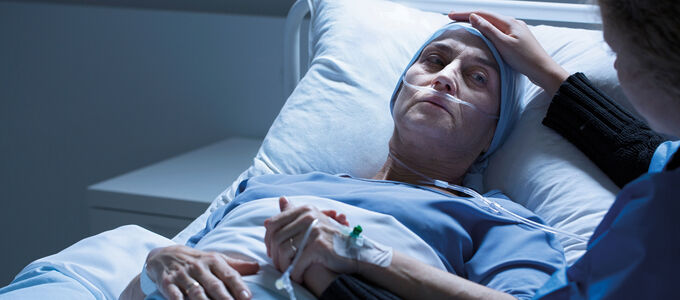
The very idea of dying can be frightening: suffering, loneliness, and being at the mercy of others are terrifying thoughts. Some people therefore want to determine themselves how their lives should end: a balancing act for which the Christian faith offers orientation.
“Between euthanasia and palliative care” is the title of a doctrinal article that is featured in the just published July issue of community. The corresponding elaboration was developed by the Working Group Medicine, which is composed of medical, psychological, and legal experts.
“Every human being has the right to die with dignity,” the paper states, thereby making the position of the New Apostolic Church clear. “The dying process is often associated with pain, the loss of individuality, and the fear that it will be prolonged with the use of medical apparatus, medication, and artificial feeding.” This quickly leads to the subject of euthanasia.
There are two fundamentally different approaches to this: on the one hand, assisted dying, that is, euthanasia, and on the other hand, care and support in dying.
The pros and cons of assisted dying
Active euthanasia essentially implies an intentional termination of life by another at the request of a terminally ill or dying person. Assisted suicide is often mentioned in conjunction with euthanasia. In one case, someone intentionally causes the death of the patient at her or his explicit or assumed request. In the other, someone assists the patient to commit suicide.
Proponents of active euthanasia see in this the right to self-determination, which some equate with human dignity. Their central argument is to prevent unbearable suffering.
For the opponents of active euthanasia, human life is inviolable and may therefore not be actively terminated. They see dangers: countries that had initially legalised active euthanasia subject to specific conditions, later went on to broaden it; medical councils and associations fear a loss of trust if doctors are no longer only allowed to heal, but are also to actively kill.
From the perspective of faith
“From a Christian perspective life is given by God,” the article states. The dignity of human beings is based on their likeness to God and is thus independent of their abilities or state of health. Active euthanasia as well as assisted suicide transgress the Fifth Commandment: “You shall not murder.”
For the New Apostolic Church it is clear: “Active euthanasia as well as assisted suicide are rejected.”
As a gift from God, life must not be terminated arbitrarily, the paper says. This does not mean, however, that all conceivable possibilities of extending life have to be used. “Allowing a person to die by refusing life-extending treatment is not contrary to the principles of Christian faith.”“
Help in dying: recommendations
“The discussion on euthanasia is usually dominated by a single view,” the Working Group Medicine reasons. The most important aspect from a Christian perspective, namely how care and support of the dying in the form of support and alleviation of suffering is possible, is often pushed into the background.
In this context, the New Apostolic Church makes the following recommendations:
- In harmony with the Christian view of human life, care should be taken to provide the terminally ill and dying with loving, thoughtful and tender support from relatives and professionals, in pleasant surroundings.
- Palliative medical care can make pain and discomfort near the end of life bearable in many cases. Nutrition and hydration should be continued as long as it helps the dying person without making them uncomfortable.
- Palliative pain control and sedation with the objective of symptom control can carry a small risk of shortening life. As these measures are exclusively aimed at symptom control, they can be approved of..
- Pastoral care in light of the gospel, providing consistent and reliable support at this stage of life, where so much changes, is important for a dying person and for those close to them. Pastoral care and support can lessen anxiety and mobilise spiritual strength.
Photo: Photographee.eu – stock.adobe.com




